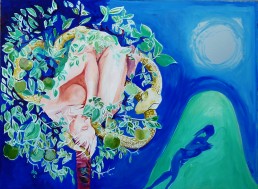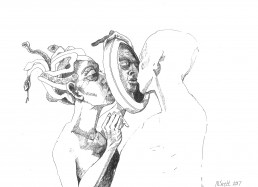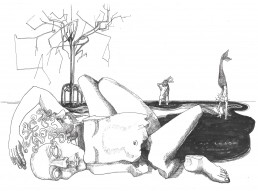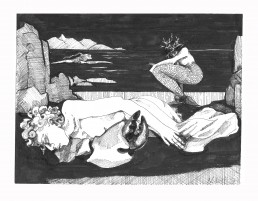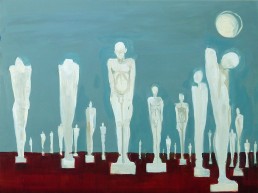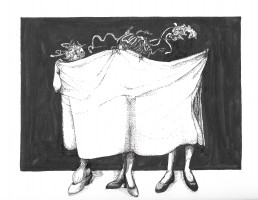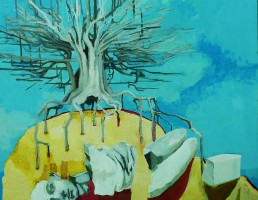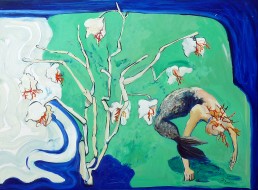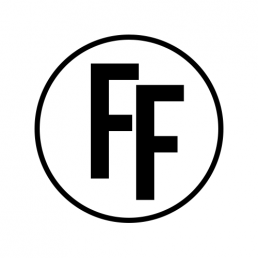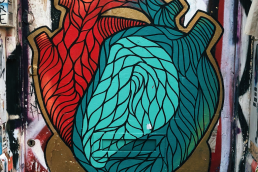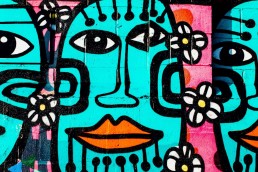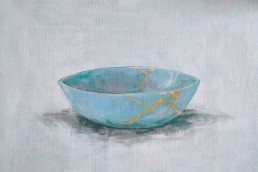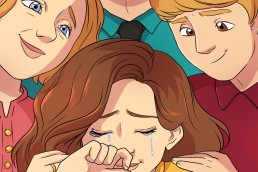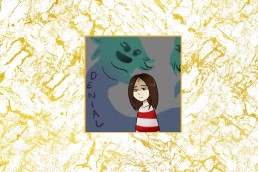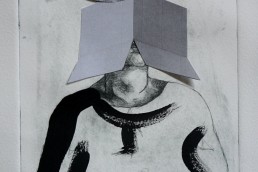Words and Arts by Natalie Sirett
Reading Fearlessly’s core aims to promote Mental Health, Creativity, Feminism and Community, that final C-word is an unresolved issue for me. The need to belong is hardwired in us all, but communities of any nature usually have clear ideas on what and who they will accept. It seems like we find it hard, even when congratulating ourselves on our inclusivity, not to enjoy the delicious listing of all those people we must reluctantly exclude. I have always identified myself as an outsider, like Groucho Marx, I refuse to join any club that will have me as a member and I’ve stalked away from more communities than you’ve had hot dinners; yet, however enjoyable bridge burning is, I admit it contributes little to my wellbeing. When the Fearless team kindly invited me to feature in this issue on Community and Wellbeing, I started to wonder if a new rebelle (as opposed to rebel), attitude is what’s needed to build better kinds of community. I’m sharing images from a new series of artworks to explain my thinking.
My practice as an artist is driven by the need to unpick the social messaging that makes growing up a girl so painfully difficult in this day and age. I want to know when it is that a girl-child becomes an object of shame. Is it at six minutes, six days, six months old? Because she sure as hell knows it, by sixteen. The roots of our shamefulness run deep. Pandora unleashes all disease, violence and sorrow on the world, when she opens her box, while Eve’s curiosity casts mankind out of paradise forever. The message is clear: Women Ruin Everything. I want to rehabilitate notorious women in our cultural DNA, to re-interrogate centuries-old judgments of our failings and our powers, making new stories to inherit.
One such monstrous woman is the snake-haired Medusa, so ugly that to look upon she turns even heroes to stone. Along with her lesser-known sisters, Medusa has been occupying my mind for some time, making a series showing their experiences living as exiles from the good and proper community, on ‘Kisthene’s dreadful plain’ (Aeschylus, Prometheus Bound).
Medusa’s First Kiss was made in a response my question, what does a girl with monstrous, destructive potential do when she needs to be loved? Medusa, like many of us, opts for compromise. Making the best mask she can, she uses a mirror to get as close as she can to a hero’s kiss. Many images in the series show the sisters living contented and self-sufficient in their outcast community. But the shadow of their exile is present in the forms of petrified men, strewn across the landscape, highlighting the problems of being isolated by difference.
It’s pretty clear that whatever our identified gender, if we spend our time madly masking everything that makes us ‘unacceptable’ and become paralysed when we encounter unmasked truth, relating is going to get difficult and both we and our communities are in trouble. However, I sincerely believe that all is not lost, not with so many voices actively calling for change: Journalist Laurie Penny, writing about lessons learned during her time on a secure ward for teenagers battling anorexia expresses the need for an unmasked attitude exquisitely. ‘Being a good girl, a perfect girl, can kill you fast or it can kill you slow, flattening everything precious inside you, the best dreams of your one life into drab homogeneity.’ (Laurie Penny, Unspeakable Things, Bloomsbury, 2014 @PennyRed).
More recently, Archbishop Desmond Tutu identifies ‘the glue of guilt and shame’ as the substance that isolates us from ourselves and others and offers much advice on how to dissolve it (Desmond Tutu, The Dalai Lama, Book of Joy, Penguin, Random House UK, 2016). Take an overview of current discussion on mental health and gender politics crises, the same conclusions tend to emerge. We need to learn to soften our judgements of ourselves and others, we need to properly interrogate received norms of acceptability, we need to become less ashamed.
To this list of sensible goals, I would add the practical advice that we need to be more playful. No one makes these kinds of changes if they get swamped in dogma. We need our creativity to kick in.
In this spirit, another work from the Medusa series, Dressed to Kill, shows our three weird sisters, magically transported into the community that banished them, all dressed up for a night on the town. A gauzy veil covers their faces, teasing us with the prospect of what might happen when they let it drop. Rather than sticking to the safety of their own personal wilderness, they have put themselves on ‘enemy’ turf and are exploring the possibility of doing so unmasked. Personally, I’m quite proud of them. Perhaps this is an example of a Rebelle, as opposed to rebel, attitude in practice?
Natalie Sirett
Natalie Sirett trained in painting at Newcastle University and the Royal Academy Schools. Her work explores feminine icons, from the ancients to newer contemporaries – Eve and Pandora, Drag Kings and Barbie Dolls. She tries to search out the roots of what defines our identity as women and to challenge perceived truths that can make growing up a girl so shaming. Coming up in 2019; SPEAKING OBJECTS EXHIBITION at University College, London, February-May 2019 and MEDUSA & HER SISTERS at the Peggy Jay Gallery, London, October 2019.

